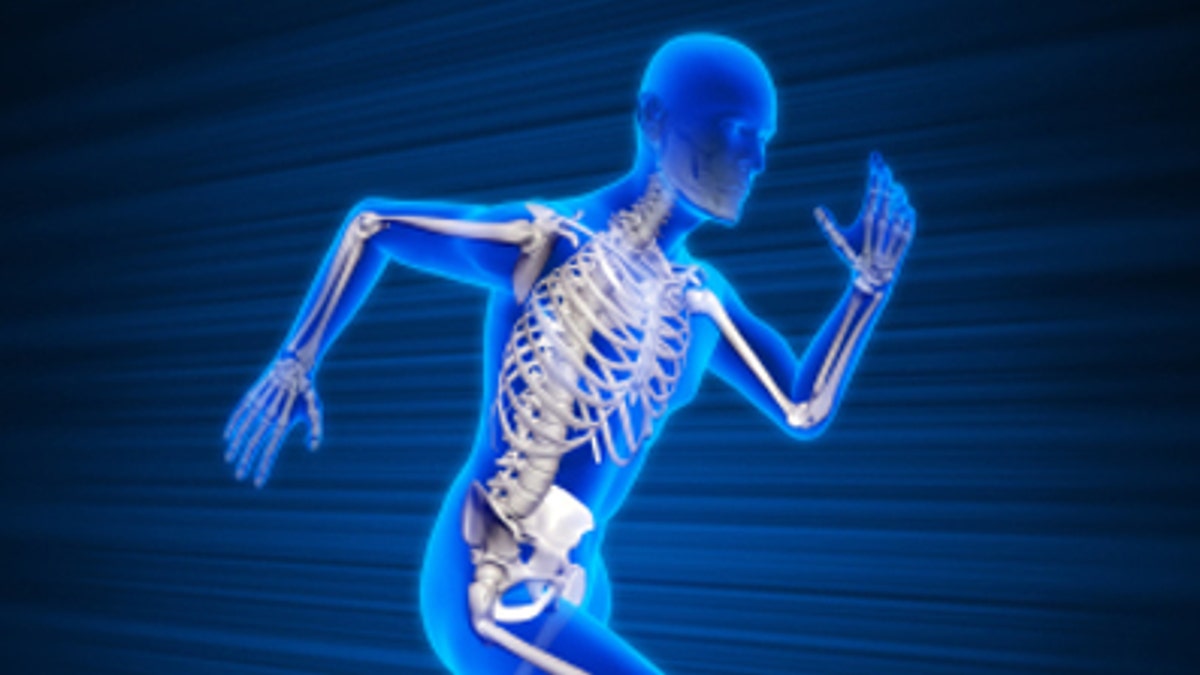
No matter how old you are, you should protect your bones by eating well, exercising, and avoiding cigarettes. But as your body, hormones, and lifestyle change, there are certain things you should do to make sure your skeleton gets the protection and help it needs. Here, decade-by-decade information on what to do to ensure that the 206 bones in your body stay strong and supportive throughout your life.
[sidebar]
Throughout your life, be sure to:
Stick with a bone-friendly diet. Eat plenty of fruits, vegetables, and low-fat dairy products. Women should consume 1,000 milligrams of calcium and 400 to 800 I.U. (international units) of vitamin D a day. After menopause, they should consume more.
Keep moving. Exercise may have a greater effect on bone strength than calcium consumption, according to recent research. The more impact, the better: Running, lifting weights, and jumping rope are all excellent bone builders.
Quit smoking. Compared with nonsmokers, women who smoke have lower estrogen levels and typically reach menopause earlier, both of which lead to lower bone density.
Watch the salt. A high-sodium diet (more than 2,400 milligrams a day) is associated with excess calcium excretion.
Be careful with alcohol. Moderate drinking (one alcoholic beverage a day for women) may be good for the bones because it increases estrogen levels; larger amounts could be harmful.
Know Your Diagnosis
There are two medical terms for low bone density. Osteopenia means you have low bone mass that isn’t low enough to be osteoporosis. About 20 percent of premenopausal women have osteopenia. Osteoporosis is much more serious and means your bones have lost so much density that they’re porous and susceptible to fractures, especially in the hips, spine, and wrists. While osteoporosis is most common after menopause, it can occur at any age.
In Your 20s
Be watchful of weight watching. If you’re dieting, be sure to exercise, too. Studies show that dieting without exercise can lead to bone loss.
Exercise smartly. Regular exercise that puts pressure on your bones (20 to 30 minutes a day is ideal), such as running and lifting weights, will help preserve bone density by encouraging the formation of osteoblasts. But don’t overdo it: If you exercise excessively, your period can become irregular or cease, which may increase your risk of premature bone loss.
Pay attention to your periods. Infrequent periods (fewer than six to eight a year) are associated with low estrogen levels and often with low body weight, “which can be a double whammy for bones,” says Dr. Felicia Cosman, the clinical director of the National Osteoporosis Foundation and a professor of medicine at Columbia University. Estrogen is your bones’ best ally because it tends to slow the rate of bone loss. So if you’re not having regular periods, speak with your gynecologist.
Think carefully about contraception. The estrogen in oral contraceptives may increase bone mass. But using Depo-Provera, the once-a-month injectable contraceptive, for more than two years has been shown to suppress estrogen production and lead to bone loss in young women, Cosman warns.
In Your 30s
Protect your bones during pregnancy. If you skimp on calcium while pregnant, your growing baby will take the calcium it needs from your bones. But if you get the recommended 1,000 milligrams a day, your body will absorb even more of the bone-fortifying mineral than usual. Afterward, breast-feeding for more than a year can adversely affect your bones, Cosman says, “but bone mass, for the most part, can be regained later if you get the requisite amount of calcium and vitamin D.”
Identify risky medications. The use of corticosteroids (to treat asthma, inflammatory bowel disease, rheumatoid arthritis, or lupus), anticonvulsants (for seizure disorders), or GnRH agonists (for endometriosis) can lead to fairly rapid bone loss, says David Hamerman, M.D., the director of the Center for Bone Health at Montefiore Medical Center, in New York City. High doses of proton pump inhibitors, which are used to treat acid reflux, may harm bones by interfering with the absorption of calcium. If you are taking one of these medications, consult with your doctor. She might choose to put you on bisphosphonates, a type of drug that counteracts bone loss, says Hamerman.
Get a grip on stress. Stress hormones, like cortisol, can inhibit bone growth and accelerate bone breakdown. Depression can have similarly harmful effects on bones.
In Your 40s
Keep an eye out for skipped periods. This could be a sign that you’re entering perimenopause, which means it’s time to step up your bone-protection plan by doing more strength-training exercises and taking calcium supplements. “When periods become irregular,” Dr. David Hamerman, the director of the Center for Bone Health at Montefiore Medical Center, in New York City, says, “the real slide in bone mass begins.”
Watch out for sneaky bone robbers. An overactive thyroid can accelerate bone loss, and type 2 diabetes may increase your risk of fractures. These conditions become more common in your 40s.
Assess risk factors. If you’ve ever suffered a fracture as an adult, if you have a family history of osteoporosis or fractures, if you are very thin or currently smoke, if you’ve ever had an eating disorder, or if you went through menopause before age 40, you have an increased likelihood of developing osteoporosis. Share these issues with your doctor; you may need to have your bone density measured if you haven’t entered menopause yet.
Discuss hormone therapy with your doctor. Short-term hormone replacement therapy (HRT) to control perimenopausal symptoms, like hot flashes, is not considered risky and can be good for the bones, says Dr. Edward S. Leib, director of the Osteoporosis Center at Fletcher Allen Health Care, in Burlington, Vermont. But over time HRT can increase the risk of a heart attack or breast cancer, so discuss the pros and cons with your doctor








































